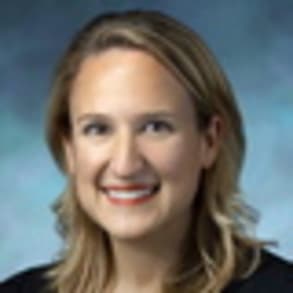Enhanced Recovery After Surgery (ERAS) is a global surgical quality improvement initiative and these improved protocols help decrease length of stay, complications, and cost without increasing readmission for surgical patients. Dr. Rebecca Stone outlines how ERAS has been implemented into the standard of care at Johns Hopkins.
Hello. I'm Rebecca Stone, the division chief of oncology at johns Hopkins. At the system level. I serve as the director of surgical pathways within the armstrong Institute of quality and Safety. And is the surgeon lead for care transformation. The mission of the surgical pathways program at johns Hopkins is to develop and to put into action. Multidisciplinary care plans that translate the latest best evidence into high value peri operative care and enhanced recovery after surgery or Iran's pathways have really become the shining stars of much of this work. Over the past decade we have come to value standardization of peri operative care through eras because it offers a pragmatic patient centered way for us to eliminate disparities and to achieve equitable surgical care. Every enhanced recovery pathway whether it is intended for patients recovering from a whipple or from a C. Section has five key components. He should education and optimization. Multimodal opioid sparing and algae, asia, nausea, infection and clot prevention, maintenance of you bulimia and early nutrition and activity. The many interventions that bring each of these five key components to life are aimed at minimizing surgical stress. Every intervention targets factors that delay recovery such as slow return of malfunction, immobility and pain. And we have a lot of data that it really works. Simple interventions like encouraging patients to drink clear liquids until 2 to 4 hours before surgery as opposed to keeping them MPO after midnight are really impactful oral hydration until a few hours before surgery can significantly decrease the need for I. V. Fluids in the O. R. And this is really important because too much I. V. Fluids compromises healing. Did you know that? It's estimated that a one liter bag of normal sailing as as much salt as three party sized bags of lay's potato chips, preventing as opposed to reacting to pain, is another theme that runs through every Iran's pathway. And the ultimate goal here is to minimize the prescribing of narcotics. Opioids have a number of adverse effects that compromise surgical recovery, including postoperative nausea and vomiting, respiratory depression, delirium, bowel dysfunction, urinary retention, immuno compromise and addiction. Even after short term opioid use, worse dependency on inpatient narcotics directly translates into post discharge use. We now know that upwards of 8% of opioid naive patients undergoing non cancer procedures, developed new persistent opioid use and that risk is even higher after curative intent surgery. This vastly surpasses the .4% rate of new persistent opioid use in nonsurgical populations. Thus, we are absolutely committed to using interventions across the preoperative continuum to decrease opioid dependency in our patients on ERAs, we prescribe preventative non opioid medications in the hour leading up to surgery. We work with anesthesia to provide patients with local and regional nerve blocks, tailored to their procedures and continue non opioid medications on a scheduled basis. Post operatively to avoid pain. The prevention of surgical site infection is equally important to the high quality and safety of care. We aim for with ERAs our surgical site infection prevention bundle is an era's crown jewel and we are constantly working to make it better and better. For example, we most recently partnered with the allergy Center at Bayview to add a workflow to our ERA's pathways that facilitates preoperative penicillin allergy verification for patients who are labeled penicillin allergic. Why is this so important? penicillin allergic patients are typically prescribed. An alternative to penicillin is for infection profile access in the O. R. And this practice is associated with a 50% increased risk of surgical site infection because these alternative antibiotics just don't work as well. While 10% of patients are labeled penicillin Allergic, nine out of 10 of them are not truly allergic. So we can clear the vast majority of patients erroneously labeled as penicillin allergic before surgery so that they can receive the most effective antibiotic prophylaxis against surgical site infections. Does all of this work loads of data that it does for our guy, not patients undergoing large open abdominal surgeries. Iraq's decreases narcotic consumption and need for PC. A narcotic pumps by 45% while maintaining good pain control. If anything, our patients score less pain on postoperative days, 2-3 than before. Further data showed that a third of patients do not need any opioid pain medication at home after hospital discharge. Iraq also decreases major complications like surgical site infection by 30% and decreases length of in patients day after surgery by at least a day for us. The rest decreases total cost of care by 15%. So it really is a win all around last a word about patient education. We know this is absolutely critical to success. We all agree that this era's component deserves as much attention as any other, but it is probably the one in need of a sprucing up the most, so to speak. So. Over the past year, our surgical teams and the office of patient and family education under the direction of Tom Bauer partnered with Wolters Kluwer to innovate arrest patient education. We are working to engineer a way to use mainstream smart devices as a media for patient coaching education and reporting the idea here is that our patients can report out their knowledge about and participation in eras as well as their achievement of recovery milestones like mobility and others using their mainstream smart devices. Thus, we have a way to engage and interact with patients preparing for and recovering from surgery in ways we never dreamed possible. And this really is living proof that the more we dream, the more we can achieve. Thank you



